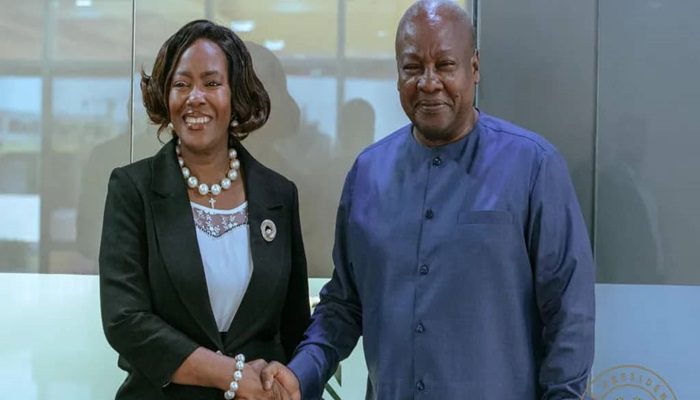The Ghana Bar Association (GBA) has launched a vigorous defence of Chief Justice Gertrude Torkornoo, calling for the immediate revocation of her suspension and urging the enactment of clear regulations to govern judicial disciplinary proceedings.
At the heart of the GBA’s demands are the principle of constitutional adherence, transparency, and the protection of judicial independence—values the Association said are under threat in the current unfolding events.
GBA decries “unconstitutional” suspension
In a resolution signed by GBA National President, Mrs. Efua Ghartey, and National Secretary, Kwaku Gyau Baffour, the Association described the suspension of Chief Justice Torkornoo as unconstitutional.
The decision, taken by President John Mahama following a prima facie determination of misconduct, was criticized for lacking the legal basis required by Article 296 of the 1992 Constitution, which mandates that the exercise of discretionary powers must be guided by published Constitutional or Statutory Instruments.
“The President, not being a judge or judicial officer, exercised discretion under Article 146(10) of the Constitution without a published Constitutional Instrument or Regulation.
“This omission renders the suspension unlawful and sets a dangerous precedent,” the GBA stated in a press release issued after its Mid-Year Conference held in Accra on April 26.
Supreme Court’s 2020 warning ignored
In 2020, the Supreme Court, in The Republic v. The Chief Justice and The Attorney-General, had already raised alarm bells about the absence of clear procedures.
Led by Justice Jones Victor Mawulorm Dotse, the Court urged for the formulation of rules to govern the impeachment of Article 71 officeholders.
“Judges must be accorded a fair measure of justice, fairness, and equity in all deliberations that affect them,” the judgment said.
Four years after that landmark ruling, it is unacceptable that no rules had yet been established.
Demand for regulations and full disclosure
The GBA has called for the urgent formulation and publication of comprehensive rules and procedures under Article 146 of the Constitution, which outlines the removal process for Superior Court judges.
According to the Association, the absence of such regulations weakens the integrity of the process and creates opportunities for political manipulation.
In addition, the Bar is demanding full disclosure of the prima facie evidence that formed the basis for the suspension, arguing that transparency is critical to preserving public confidence in the judiciary and the rule of law.
GBA urges withdrawal of Acting CJ’s directive
Alongside its opposition to the suspension, the GBA also raised concerns over a recent administrative directive issued by the acting Chief Justice, Justice Paul Baffoe-Bonnie.
In a circular dated April 23, 2025, Justice Baffoe-Bonnie ordered all registrars of the High Courts, Courts of Appeal, and Supreme Court to submit all new cases and applications directly to his office for assignment and scheduling.
The GBA characterized the directive as “uncertain” and potentially disruptive to the judicial process.
It warned that bypassing existing technological systems for case assignment could impair the efficiency of the courts and slow down justice delivery.
“Recognising the urgency of delivering justice and the importance of integrating technology, the GBA respectfully requests that this directive be withdrawn.
“Centralising case assignment at the top risks creating unnecessary bottlenecks and undermining transparency,” the statement read.
GBA reaffirms commitment to rule of law
Throughout the resolution, GBA reasserted its commitment to upholding the rule of law, judicial accountability, and the protection of judicial independence from political interference.
It condemned unsubstantiated political commentary aimed at the judiciary, warning that such attacks only serve to erode the public’s trust in democratic institutions.
The Association emphasized that legal procedures involving judges must comply with Article 296, which requires that any person or authority exercising discretionary power must do so fairly and reasonably, based on published rules.
Without adherence to these constitutional safeguards, the GBA warned, the country risks slipping into a regime of arbitrary and politically motivated justice.
Committee set up amid controversy
President Mahama’s suspension of Chief Justice Torkornoo came after a committee established under Article 146(6) and in consultation with the Council of State found that a prima facie case had been made against her, based on three separate petitions.
The specifics of those petitions have yet to be made public—a point of major contention for the GBA.
While the President acted within the constitutional framework in consulting the Council of State and setting up the investigative committee, the GBA insists that the process lacked the necessary legal clarity and procedural safeguards, particularly the absence of binding, published rules guiding such action.
GBA calls for legal reform and safeguards
The Association concluded its resolution with a call for broader judicial reforms aimed at ensuring that processes such as the impeachment or removal of judges are handled with the highest degree of legal precision and transparency.
It urged Parliament to work swiftly in crafting the required regulatory framework, warning that failure to do so could weaken the very foundations of judicial independence in Ghana.
As the situation develops, the GBA has pledged to explore legal avenues to safeguard the rights of the Chief Justice and the integrity of the country’s legal system, signaling that the country’s legal fraternity is prepared to take a stand in defence of constitutional order.
By ELVIS DARKO, Accra
- Disclose Prima Facie evidence in CJ’s case-GBA to Mahama - 29 April 2025
- MTN Ghana records stellar start to 2025 - 29 April 2025
- 65% of teens mining communities abandon school for gold - 29 April 2025




